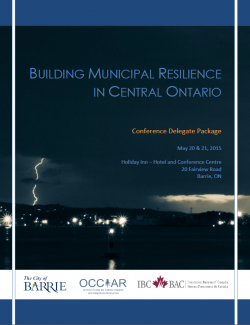May 26, 2015
City of Barrie on Building Municipal Resilience
Last week, I attended the “Building Municipal Resilience in Central Ontario” conference hosted by Mayor Jeff Lehman at the Holiday Inn Hotel and Conference Centre in Barrie. The event was attended by about 60 municipal representatives including elected officials, planners, engineers, and emergency managers. One of the key takeaways from the event was the collective realization that we have to deal with the ever growing reality of climate change. There was a general agreement that greenhouse gas emissions have reached unprecedented levels in the atmosphere and that even if we reduce these levels, we will continue to feel the cascading impacts of this in the coming years. As a result, we need to collaboratively undertake adaptation efforts that will help our communities become more resilient to these impacts.
 During the presentations in the morning, extreme weather was a hot topic. Mayor Jeff Lehman recalled the F4 tornado that hit Barrie in May 1985 and Mayor Rick Goldring recalled the flood that hit Burlington in August 2014. These extreme weather events had significant impacts on both communities which were outlined by the respective speakers. Coming out of these presentations, both mayors agreed that we need to deal with the day-to-day realities of climate change and do what we can to adapt to climate change now.
During the presentations in the morning, extreme weather was a hot topic. Mayor Jeff Lehman recalled the F4 tornado that hit Barrie in May 1985 and Mayor Rick Goldring recalled the flood that hit Burlington in August 2014. These extreme weather events had significant impacts on both communities which were outlined by the respective speakers. Coming out of these presentations, both mayors agreed that we need to deal with the day-to-day realities of climate change and do what we can to adapt to climate change now.
Following these remarks, there were a number of sessions that examined the impact of climate change on emergency management as well as asset management and infrastructure. I attended the sessions which focused the latter and it was really interesting to see the common themes that emerged from the presentations. For one, green infrastructure was on the radar of many speakers as an adaptation strategy that can be used to deal with flooding and other climate change impacts.
In addition to this, a number of presenters spoke about the risk assessment frameworks and tools that are currently being used. Sally Turney profiled that Municipal Risk Assessment Tool (MRAT) that has been developed by the Insurance Bureau of Canada (IBC) while Kerry-Ann Charles highlighted the risk and vulnerability assessment that has been undertaken by the Georgina Island First Nation. Presenters like Jacqueline Weston (Director of Engineering, City of Barrie) also spoke about future work they will be undertaking. This year, the City of Barrie will be developing a framework for a climate change adaptation strategy and this will be followed by a full strategy next year. The City of Barrie will also be conducting a risk assessment and they will be deciding on a framework to use for that in the near future as well.
Some presenters also spoke about the trends that we’re seeing and can expect to see over the coming years. Over the last few years, we have generally heard a lot about the overall warming trend that is occurring across the globe. In this context, Heather Auld from Risk Sciences International (RSI) spoke about the elephant in the room…despite the warming trend, why have the last couple of winters in eastern North America been particularly cold? She stated that 2014 was in fact the warmest year on record globally; however, eastern North America was an anomaly due to the polar vortex. Heather also mentioned that the polar vortex has also received a lot of media coverage over the last couple of years; however, scientists have been studying this wind pattern for many years and so this is not a new concept.
At the end of the day, Mayor Lehman concluded the event with some final thoughts. He stated that there will be a greater need for adaptation in the coming years and we need to be prepared for this. He provided the “Kodak” example to support his point. The company was able to popularize the “a Kodak moment” slogan and also invented a key piece of technology that is used in digital cameras; however, the company didn’t anticipate how quickly the market would change. As a result, it lost money for 5 straight years and eventually went bankrupt in 2012. Mayor Lehman contrasted this example with how Apple managed a similar situation. The company invented the MacBook but eventually found its market share plummeting; in response to this, Apple created the iPod which helped to rebound their brand.
Bringing this back to climate change, the mayor stated that there a lot of opportunities to address climate change. The science is clear, both locally and globally, and there is also a lot of capacity in the municipal, academic, and insurance communities – more than there was five years ago. At the same time, there is also a need for qualitative stories that support the science and the numbers so that we can get emotional buy-in to succeed, especially from those that are going to drive change. Moving forward, Mayor Lehman stated that there is a clear and compelling case for this and we don’t need to be afraid of talking about climate change in the community. I found the Mayor’s tone quite refreshing and look forward to the action that the City of Barrie will take on climate change in the near future.
About the blogger
 Simran Chattha is a Coordinator of Climate Research Mobilization with the Ontario Climate Consortium. Her research interests lie on the interface of environmental policy and climate change adaptation.
Simran Chattha is a Coordinator of Climate Research Mobilization with the Ontario Climate Consortium. Her research interests lie on the interface of environmental policy and climate change adaptation.




Comments are closed here.